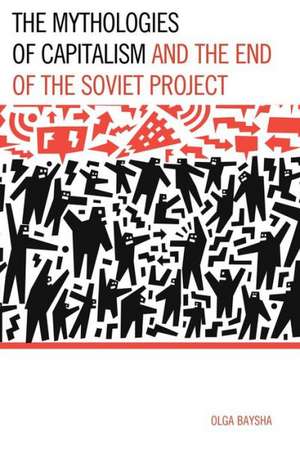The Mythologies of Capitalism and the End of the Soviet Project
Autor Olga Bayshaen Limba Engleză Hardback – 14 aug 2014
Preț: 699.17 lei
Preț vechi: 908.02 lei
-23% Nou
Puncte Express: 1049
Preț estimativ în valută:
133.79€ • 140.04$ • 111.35£
133.79€ • 140.04$ • 111.35£
Carte tipărită la comandă
Livrare economică 31 martie-14 aprilie
Preluare comenzi: 021 569.72.76
Specificații
ISBN-13: 9780739188026
ISBN-10: 073918802X
Pagini: 171
Ilustrații: 12 tables
Dimensiuni: 150 x 231 x 20 mm
Greutate: 0.41 kg
Editura: Rowman & Littlefield
ISBN-10: 073918802X
Pagini: 171
Ilustrații: 12 tables
Dimensiuni: 150 x 231 x 20 mm
Greutate: 0.41 kg
Editura: Rowman & Littlefield
Notă biografică
Olga Baysha is assistant professor at the National Research University Higher School of Economics, Moscow, Russian Federation.
Cuprins
CONTENTS
INTRODUCTION
PART I. MODERNITY AND MYTH
CHAPTER 1. Modernity and Its Projects
Modernity, Colonization, and Globalization
Multiple Modernities and Cultural Hybridization
Modernization through Internal Colonization
The Myth of Enlightenment
CHAPTER 2. Deconstructing Mythologies
Roland Barthes¿s Mythologies
The Schizophrenia of the Network
The Idea of Framing
Frame Analysis of Modernization Myths
PART II. SOVIET MODERNITY
CHAPTER 3. The Rise and Fall of an Alternative Project Great Transformation
Stagnation and Gorbachev Reforms
CHAPTER 4. The Discourses of Perestroika
Democracy
Market
The United States
PART III. THE VERNACULAR VS. THE ELITE
On Methodology
CHAPTER 5. Mythologizing Democracy
Intellectual Mythology: The Highway of Civilization
Vernacular Mythology: Power to the People!
CHAPTER 6. Mythologizing the Market
Intellectual Mythology: The invisible Hand
Vernacular Mythology: Enriching Working People
CHAPTER 7. Mythologizing the United States: The Horn of Plenty
PART IV. THE SCHIZOPHRENIA OF PERESTROIKA
CHAPTER 8. The Twilight Zone The Spirit of Hopelessness World Risk Society The Logic of Both / And
CHAPTER 9. Schizophrenia as a Communicative Disorder Double Bind Network Schizophrenia and the Public Sphere
CHAPTER 10. Personal Reflections
CONCLUSION
BIBLIOGRAPHY
Primary Sources: Media Articles
Secondary Sources
APPENDIX A . Research Design Data Collecting Coding
APPENDIX B . Statistical Results
Descriere
Applying postcolonial, poststructural, and globalization theories to post-Soviet transformations, author Olga Baysha seeks to explain the gap between how the intellectuals and working people of the late USSR imagined marketization and democratization.
